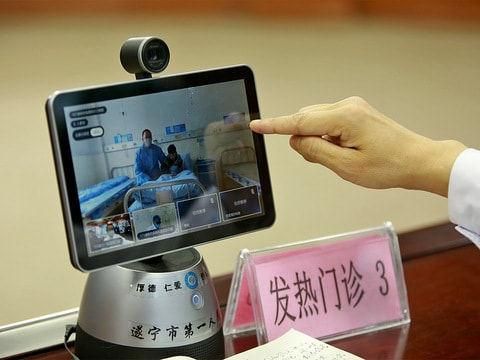Telemedicine stocks took off mid-pandemic as remote healthcare rose in demand. Stocks including Alibaba Health, JD Health and Pingu An have slightly wobbled as Chinese virus restrictions ease, but the overall market in Asia is projected to grow.
- JD Health’s share price is down in the week to 6 January, despite launch of ‘anti-COVID clinic’
- JD Health and Alibaba Health share prices beat the market in 2022. Ping An struggled, but is up 9% in 2023
- Global Telemedicine & Digital Health ETF offers exposure to Alibaba Health, JD Health and Ping An
Asian telemedicine stocks like JD Health [6618.HK], Alibaba Health [0241.HK] and Ping Healthcare [1833.HK] had varying degrees of success during 2022, but are all set to gain this year as China reopens.
The telemedicine theme prospered during the pandemic when patients were unable to access in-person healthcare and relied on remote solutions. Telehealth has since become part of the permanent landscape, especially as traditional healthcare services struggle to meet patient demand. As China reopens following easement of its zero-COVID restrictions, investors will be watching for impacts on the theme of telemedicine.
Chinese ecommerce platform JD Health slipped 8.8% over the past year, but only 1% so far in January. The company recently launched an online ‘anti-COVID clinic’ that provides round-the-clock consultations.
Alibaba Health, which offers online consultations and is backed by Chinese multinational Alibaba [BABA], has risen by 12.3% so far in 2023 and 6.3% over the past year.
Leading Chinese virtual doctor service Ping An Healthcare dropped by 19.2% over the last year, but is up 8.9% so far in 2023.
Growing telehealth customer base in Asia
Despite recent setbacks, leading Asian telehealth companies appeared to increase their customer reach in 2022.
Chinese B2C giant JD.com’s [JD] health offshoot JD Health is the “largest online healthcare platform” in China, according to its website. In the company’s third quarter 2022 earnings posted on 18 November, it announced net revenues of 243.5bn Chinese renminbi (¥), a rise of 11.4% year-over-year. Annual active customer accounts jumped 6.5% to 588.3 million for the year ended 30 September 2022.
At its last earnings report for the three months ended 30 September, Alibaba posted a revenues increase, with sales hitting ¥207.2bn, up 3% year-over-year. It attributed the 6% year-over-year increase in direct sales for its China commerce retail business to Alibaba Health and Freshippo, a combined grocery store, restaurant and delivery app.
Last year, Ping An also posted growth for online medical offerings, with revenues of ¥2.8bn for the first half of 2022, with cumulative paying users reaching more than 40 million. Its gross margin for medical services rose 13.3% year-over-year.
Telemedicine here to stay
Telehealth boomed during lockdowns as access to traditional healthcare settings became challenging and patients sought remote solutions. While demand might have trailed off, data suggests telemedicine’s potential is far from over.
In 2019, the World Economic Forum estimated half of the global population lacked essential healthcare. As more regions gain broadband access, however, telemedicine could help plug the gap.
A report by Fact and Factors valued the global telemedicine market size at $85.1bn in 2021, and predicts it will rise to $342.1b by 2028, reflecting a compound annual growth rate (CAGR) of 26.1%.
Alongside rising healthcare costs and increasing technology adoption, China’s ageing population may drive growth in the telemedicine sector. In 2020, the country’s Ministry of Civil Affairs said China’s senior population will reach 300 million by 2026. It forecast that by 2040, there will be a population of 400 million older Chinese citizens and fewer babies.
Funds in focus: Global Telemedicine & Digital Health ETF
The Global X Telemedicine & Digital Health ETF [EDOC] offers exposure to companies in the telehealth space and is based on the Solactive Telemedicine & Digital Health Index. As of 10 January, Alibaba Health was the largest holding in the fund’s portfolio with a 7.12% weighting. The second-largest holding was JD Health with a 6.34% share of the portfolio. Other names in the fund include Teladoc [TDOC] which holds 3.44%, while Ping An has less exposure with a 2.25% weighting. In the last 12 months, the fund has fallen by 22.6%, but is up 5.4% so far in 2023.
The Horizons GX Telemedicine and Digital Health Index ETF [HDOC] invests heavily in EDOC, but is hedges its US dollar exposure back to the Canadian dollar. Its results largely mirror the previously mentioned fund, having dropped 22.8% over the past 12 months. In 2023 so far it has gained back 1.9%.
Disclaimer Past performance is not a reliable indicator of future results.
CMC Markets is an execution-only service provider. The material (whether or not it states any opinions) is for general information purposes only, and does not take into account your personal circumstances or objectives. Nothing in this material is (or should be considered to be) financial, investment or other advice on which reliance should be placed. No opinion given in the material constitutes a recommendation by CMC Markets or the author that any particular investment, security, transaction or investment strategy is suitable for any specific person.
The material has not been prepared in accordance with legal requirements designed to promote the independence of investment research. Although we are not specifically prevented from dealing before providing this material, we do not seek to take advantage of the material prior to its dissemination.
CMC Markets does not endorse or offer opinion on the trading strategies used by the author. Their trading strategies do not guarantee any return and CMC Markets shall not be held responsible for any loss that you may incur, either directly or indirectly, arising from any investment based on any information contained herein.
*Tax treatment depends on individual circumstances and can change or may differ in a jurisdiction other than the UK.
Continue reading for FREE
- Includes free newsletter updates, unsubscribe anytime. Privacy policy





